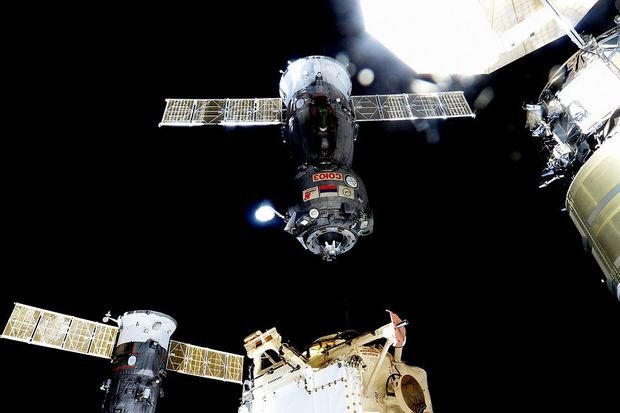Roscosmos: air leak at ISS could be intentional sabotage
Russian space authorities consider the possibility of sabotage as a reason for the recent air leak in Soyuz spacecraft docked at the International Space Station (ISS). Energia space company, the manufacturer of Soyuz, will perform checks for possible defects on all spaceships at its production site as well as at Baikonur Cosmodrome. However, the authorities do not rule out that the hole could be done by astronauts in space.
Head of Russia's space agency Dmitry Rogozin stated that the hole detected on 30 August in Russian Soyuz spacecraft was caused by a drill and could have been done deliberately, says AFP. According to Rogozin, identifying the culprit by name is a ''matter of honour'' for Russia's Energia space manufacturing company. Energia will also carry out checks for possible defects on all Soyuz and Progress spaceships at its production site outside Moscow and at Baikonur Cosmodrome in Kazakhstan.
Earlier, it was announced that the hole was most likely caused from outside by a tiny meteorite, but last Monday, Rogozin claimed that they had already ruled out the meteorite version. He pointed out that there were several drilling attempts. ''We are checking the Earth version. But there is another version that we do not rule out: deliberate interference in space.''
An unnamed space industry source of TASS state news agency assumed that the spacecraft could have been damaged during tests at Baikonur Cosmodrome in Kazakhstan after passing initial checks, and the mistake was then hastily covered up. ''Someone messed up and then got scared and sealed up the hole,'' said the source, adding that the sealant ''dried up and fell off'' when Soyuz reached the ISS.

The ISS and space partnership is one of the few areas of Russia-US cooperation that remains unaffected by the deterioration in relations between the countries. The current ISS crew consists of two Russian cosmonauts, three NASA astronauts and one German astronaut from the European Space Agency.
Meanwhile, Roscosmos has proposed a bill aimed to increase state control over strategic enterprises of the space industry, reports UrduPoint. Among other things, the draft proposes to regulate ''the order of determining stakeholders'' both on the part of both Roscosmos and the state. Besides, it envisages an increase in the number of organisations that can be owned by Roscosmos (it already owns over 70 enterprises, including research centres, logistics companies, production plants, etc.) and allows the corporation to set up commercial enterprises.